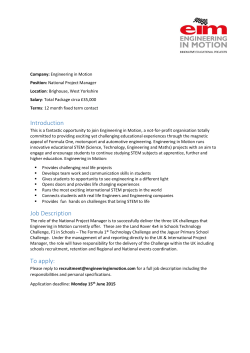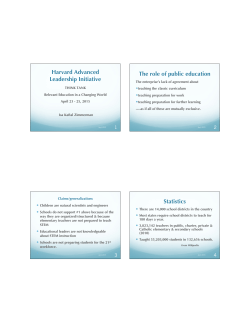
WHY CHAMPION SCIENCE AND ENGINEERING?
WHY CHAMPION SCIENCE AND ENGINEERING? If we are to meet the economic, health, security, and environmental challenges facing our society, policy makers need to champion science and engineering. This short briefing highlights the current evidence for how science and engineering supports… A strong economy High value jobs Healthier and happier lives Government investment in science and engineering creates a virtuous cycle, leveraging investment from industry1, raising productivity2, and creating more high-value jobs3. It is a highly effective way to invest public money to drive economic growth. A wide range of industries, from manufacturing to digital technology, rely on science and engineering to innovate, grow, and create high-value jobs8. Investment and support for science and engineering is essential for the future of the UK’s high-tech and knowledge-based economy. Science and engineering produces more effective medicines and cleaner energy, generates new technologies and informs government policy. Science and engineering can enable technological improvements and economic growth alongside environmental and social improvements, leading to healthier and happier lives for all13. • 20% of the workforce is employed in science and engineering roles, a total of 5.8 million people in 20119. STEM graduates pay more tax as they earn 20% more on average10. • Global research efforts have led to cancer treatments and interventions delivering health gains equivalent to £124 billion for UK patients between 1991 and 2010 through prevention, early detection, and improved survival14. • Government R&D grants can stimulate around 30% more self-investment from industry4 and for every £1 spent by the government on R&D, private sector R&D productivity rises by 20p per year in perpetuity5. • Innovation was responsible for half of all UK labour productivity growth between 2000 and 2008, with 32% of that attributable to changes in technology resulting from science and engineering6. Productivity growth is essential to raise wages and living standards. • Increasing public and private R&D spending and tackling the STEM* skills shortage to improve UK business supply chains could add £30 billion to the UK economy by 2025 by boosting the manufacturing sector and creating over 500,000 jobs7. • Growth of innovative UK firms starts with the hiring of more STEM graduates followed by increased R&D spending, resulting in new products to market and higher sales growth11. • The UK needs 1.28 million new science, engineering, and technology professionals and technicians by 2020. Failure to meet this could cost the UK £27 billion a year12. *STEM stands for Science, Technology, Engineering, • One million more properties were protected in the floods of 2013-14 compared to similar floods in 2007 as a result of government-funded research. This saved £2.6 billion of lost working days in London alone and £2 billion in fewer and less expensive insurance pay-outs15. • R&D has improved aircraft fuel efficiency by 30% since 1990, saving over 400 million tonnes of CO2 per year, and is expected to improve efficiency by a further 38% between 2010 and 205016. and Maths. “Being at the cutting edge of R&D can help boost exports, attract investment to the UK and drive growth.” John Cridland, CBI Director-General The Campaign for Science & Engineering (CaSE) is the leading independent advocate for science and engineering in the UK. CaSE calls on the government to increase investment in research, support STEM education from primary school through to university, and set immigration policies that help attract and retain top talent. CaSE’s top ten actions to champion science and engineering are available on our website, www.sciencecampaign.org.uk, where you will also find more detailed analysis and recommendations presented in three CaSE briefings. Our mission is to raise the political profile of science and engineering. We passionately believe in the economic and cultural importance of scientific and technological education and development, and the vital need for the funding of this research by government and industry. The strength of our policy advocacy is due to our political networks, independent analysis, broad membership, and responsiveness. References and further reading 1. Research Councils UK, Leverage from public funding of science and research, 2013 Higher Education Funding Council for England, A review of QR funding in English higher education institutions, 2014 Health Economics Research Group, Office of Health Economics, RAND Europe, Medical Research: What’s it worth? Estimating the economic benefits from medical research in the UK, 2008 Department for Business, Innovation and Skills, Estimating the effect of UK direct public support for innovation, 2014 Technology Strategy Board: Evaluation of the Collaborative Research and Development Programmes, 2011 2. Jonathan Haskel, Alan Hughes and Elif Bascavusoglu-Moreau, The Economic Significance of the UK Science Base, 2014 Department for Business, Innovation and Skills, Innovation report 2014 Jonathan Haskel and Gavin Wallis, Public support for innovation, intangible investment and productivity growth in the UK market sector, 2013 Oxford Economics, The impact of the innovation, research and technology sector on the UK economy, 2014 3. 4. If you are reading a printed version of this please go online to access hyperlinks at http://goo.gl/PDRfrx Phone 020 7679 4994 Email info@sciencecampaign.org.uk The Science Council, The current and future UK science workforce, 2011 Confederation of British Industry, Engineering our future, 2014 Royal Academy of Engineering, Engineering for Growth, 2014 Tech City UK, Tech Nation 2015, 2015 Deloitte, commissioned by the Institute of Physics, The Importance of Physics to the UK Economy, 2014 Department for Business, Innovation and Skills, Estimating the effect of UK direct public support for innovation, 2014 5. Jonathan Haskel, Alan Hughes and Elif Bascavusoglu-Moreau, The Economic Significance of the UK Science Base, 2014 6. Department for Business, Innovation and Skills, Estimating the effect of UK direct public support for innovation, 2014 7. Confederation of British Industry, Pulling together, 2014 8. The Science Council, The current and future UK science workforce, 2011 Technopolis, Assessing the economic returns of engineering research and postgraduate training in the UK, 2015 Deloitte, Measuring the economic benefits of mathematical research in the UK, 2012 Deloitte, commissioned by the Institute of Physics, The Importance of Physics to the UK Economy, 2014 Oxford Economics, The economic benefits of chemistry, 2010 Tech City UK, Tech Nation 2015, 2015 9. The Science Council, The current and future UK science workforce, 2011 10. Institute for Education, The labour market value of STEM qualifications and occupations, 2011 11. Department for Business Innovation and Skills, Innovative firms and growth, 2014 12. Royal Academy of Engineering, Engineering for Growth, 2014 13. Research Councils UK, Impact report, 2014 14. Matthew Glover, Martin Buxton, Susan Guthrie, Stephen Hanney, Alexandra Pollitt and Jonathan Grant, Estimating the returns to UK publicly funded cancer-related research in terms of the net value of improved health outcomes. 2014 15. Natural Environment Research Council, Impact Report, 2014 16. Sustainable Aviation, Sustainable Aviation CO2 road-map, 2012 Designed by vincentdesign.co.uk Published May 2015 This document was produced with the generous support of the Royal Society of Chemistry
© Copyright 2025









